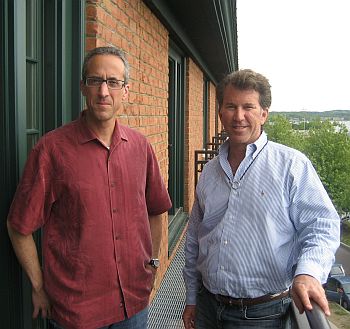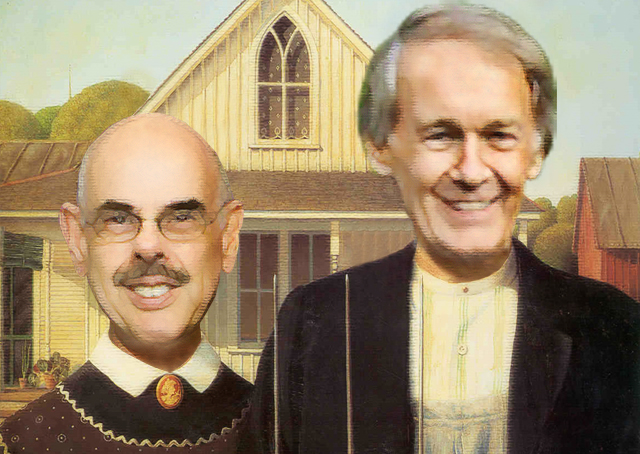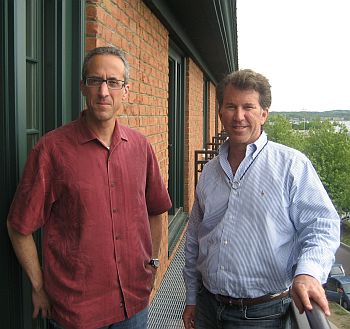Entrepreneur Jeffrey Hollender launched a mail-order catalog business 20 years ago and nursed it for more than a decade before it became profitable. That company is now Seventh Generation, and there’s no more catalog, but there certainly is a ton of recycled toilet paper — and all-natural cleaning supplies and non-toxic personal-care products.
 It’s a product category that has seen massive growth in the last few years as environmental issues have risen to front-page news status. In fact, Seventh Generation saw its biggest numbers recently — posting about 50 percent growth last year. Which is exactly why Hollender has decided it’s time to step down from his role as CEO.
It’s a product category that has seen massive growth in the last few years as environmental issues have risen to front-page news status. In fact, Seventh Generation saw its biggest numbers recently — posting about 50 percent growth last year. Which is exactly why Hollender has decided it’s time to step down from his role as CEO.
Sound like odd timing? Not for Hollender. “I realized that I lacked most of the experience that would be required to manage that growth to its fruition,” he says. Hollender was also growing increasingly torn between other projects like writing — his next book, In Our Every Deliberation, comes out next month — and speaking gigs, and a TV program called Big Green Lies. “As I wandered around the offices, I began to wonder what all the people in different rooms were doing.”
So as of last week, there was at least one more new face in the Seventh Generation offices: Chuck Maniscalco. He comes to the company from PepsiCo, where he was CEO of the $10 billion Quaker, Tropicana, and Gatorade division, which he calls “very purpose-driven businesses.” Maniscalco, who actually came out of retirement to take on this job, says he’s determined to manage Seventh Generation’s growth in a way that remains true to the company’s commitment to sustainability.
As for Hollender, he’ll be continuing in the role of “Chief Inspired Protagonist,” focusing more on corporate responsibility and sustainability advocacy work rather than being involved the company’s day-to-day operations.
I spoke to the two of them in a three-way conference call just days after Maniscalco took over his new office. Here’s what they had to say:
Q. One of the reasons you’re leaving, Jeffrey, is because of the massive growth Seventh Generation has seen recently. What do you attribute that success to?
A. Hollender: I think that we live in a world where there is a tremendous sort of search for purpose and meaning. In some respects, who Seventh Generation is and what we aspire to helps people be the people they want to be and live the lives they want to live and that is a stark contrast to what they often experience from [other] companies and businesses … [It] builds a strong and deep connection to people that I think is more important than it has perhaps ever been. Now, that’s not enough; you have to also get your products on the shelves of stores at the right price and the products have to work the way people expect them to work.
Q. Speaking of getting your products on the shelves at the right price, are you still refusing to sell them in Wal-Mart?
A. Hollender: Historically, that was true; up until a year ago while we were in a very close dialogue with Wal-Mart and working to help them become a more sustainable and responsible business, we were not comfortable selling to them. But the progress that Wal-Mart has made in the past three to four years is astounding and absolutely an incredible inspiration for what’s possible of a large company. Does that mean they’re perfect today? No, but they have made more progress than just about any company that I can think of and that progress has led us to experiment with them in a small group of stores. … So it’s really a question for Chuck in terms of when is the right time and what is the right way, but there is no philosophic issue that restrains us from doing business with them.
Q. Do you feel like it’s possible for a big company like Wal-Mart or PepsiCo to commit to the same standards of sustainability that Seventh Generation has?
 Chuck Maniscalco (left) and Jeffrey Hollender of Seventh Generation.Photo: Chrystie HeimertA. Maniscalco: I think it would be difficult for any company to ever reach up to the standards that Seventh Generation has set. I’ve never seen it before, and I probably will never see it again and that’s why I’m here. Having said that, Wal-Mart, for example, was a very big customer for PepsiCo and Quaker Oats, and Wal-Mart over the course of the last several years has been the single biggest force in getting companies in the consumer packaged-goods world to take waste out of their products, out of their packages, and out of the supply-chain stream. So I think they can be a force for good.
Chuck Maniscalco (left) and Jeffrey Hollender of Seventh Generation.Photo: Chrystie HeimertA. Maniscalco: I think it would be difficult for any company to ever reach up to the standards that Seventh Generation has set. I’ve never seen it before, and I probably will never see it again and that’s why I’m here. Having said that, Wal-Mart, for example, was a very big customer for PepsiCo and Quaker Oats, and Wal-Mart over the course of the last several years has been the single biggest force in getting companies in the consumer packaged-goods world to take waste out of their products, out of their packages, and out of the supply-chain stream. So I think they can be a force for good.
Hollender: And they can move quicker than government or any regulatory agency. Now, they don’t all use that power in ways that are beneficial, in fact we wouldn’t be in the situation we are if they did. But I don’t believe that we can solve the urgent problems that face us — whether it’s global warming, or whether it’s a crisis of fresh water or species disappearance — without aggressive leadership from the business community. Part of the role that Seventh Generation wants to play is showing business that being responsible is good business and being sustainable is good business, and that we can’t afford to have business stand in the way of the progress we need to make to become more sustainable.
Q. In the same vein, is it possible for a company like Seventh Generation to scale up? You’ve said your goal was to take the company from $150 million annually to $1 billion. How do you plan to do this while maintaining a commitment to sustainability?
A. Maniscalco: It’s a question of how to get big and be authentic at the same time … Even with all of the growth this business has had over many, many years, we have still tapped into a minority of the consumers out there who care about what we offer in our products and who care about what the company stands for … so there’s still distribution opportunities. And from a consumer standpoint, this group of people is already big and it’s growing by the day, because all of the issues that we all know the world is facing are becoming much more apparent to more people. So I absolutely think it’s doable, but you have to do it with real care and real discipline. And that’s our charge.
Hollender: It helps to be a private company so that we don’t have to answer to shareholders who’ve purchased stock in the company who might not share our vision or our values. We choose our investors as carefully if not more carefully than our employees, because the alignment of those investors is absolutely critical. I also think that what I’ve experienced is that a company with the mission we have is a magnet for the best talent in the marketplace … that’s one of the ways in which we will scale, because we can get the best and brightest people to come and join what we’re doing.
Q. When you started Seventh Generation, you were a big fish in a little pond. That pond is more crowded now; is there enough room in the pool for everyone? How do you feel about the competitors like Method who are on the shelves with you at Target or other stores?
A. Maniscalco: People always say they love competition and they rarely mean it. I would say, in this case, we love competition and we do mean it. In my view, the more people who come into this space — and do so legitimately — the greater good we’re serving. And as Jeffrey pointed out before, we don’t succeed against our mission if we do it all by ourselves. Secondly, the more people that come into this space and do it right, the more awareness and understanding consumers will have about how to behave responsibly. The challenge for us, I think, is to ensure that we keep driving standards higher and higher and higher, so that as other people come along, we still have a significant edge over them.
Hollender: One of the biggest gaps that exists today is a green product does not make a green company. And what we need to do — and what we need our customers, consumers, and partners to do — is to push businesses beyond greening a teeny part of their business, to embrace sustainability across everything they do. When you look at the competitive landscape today, it’s mostly large companies taking a small part of their portfolio and making it greener than it was before. I think that consumers will increasingly look for sustainable companies, not just sustainable products.
Q. You’re touching on a major problem for consumers: greenwashing — companies putting out products that have green labels on them, but aren’t really following that up within the actual product or their company as a whole. What can consumers do to make sure they’re buying a legitimate product?
A. Hollender: Well, I’ll just mention two things. One is we have a great application that you can download to your phone or your computer or your PDA. As you’re walking down the aisles of a grocery store, you can use this application to help make better choices. Secondly, we are big advocates of what the Good Guide is doing, and we think that the service that a third party like the Good Guide provides in making independent evaluations of the products on the shelf is a very valuable service to consumers.
Q. What is the biggest challenge for a business wanting to be truly sustainable?
A. Hollender: I think we face a couple of challenges. Clearly, education is a huge challenge, so it is critical that we help consumers make conscious and responsible choices. We need greater transparency so that they can make informed decisions. Secondly, we live in a regulatory environment that often encourages us to do the wrong thing because companies are allowed to externalize so much of their costs that dangerous, environmentally irresponsible products often cost less than sustainable, responsible products. If consumers are shown the full cost of the products and services that they’re buying, there’s no question that they will increasingly choose responsible, sustainable products.
Q. How can we show them that cost?
A. Hollender: There are hundreds and hundreds of examples, and some of them directly affect our business. We’re in the business of selling recycled tissue paper, and the government — for the last year in which a calculation was made — spent a billion dollars subsidizing the virgin timber industry by building roads and allowing that timber to be cut at below-market prices. What that does is it artificially makes recycled fiber more expensive. All of these things send the wrong message to the consumer, and we need to actively make sure that the government and the regulatory agencies are reflecting decisions that are in the best interest of future generations, not the shareholders of some of America’s largest companies.
Q. So, it’s got to be a political-activism sort of thing?
A. Hollender: It does, and Chuck’s going to allow me more time to do that, which I’m looking forward to.
Maniscalco: The great news is we’ve now got Jeffrey playing a much bigger role in that big external environment, and I can get really focused on driving [the company] from the inside, and I think that’s a really good one-two punch.
Hollender: Absolutely. We’re subtly sending a message to all these large companies that they better, to a certain extent, watch out because this is a game-changing event for our business and for our industry. The addition of Chuck to Seventh Generation will dramatically accelerate the need for everyone to rise to a higher standard and move more quickly in a sustainable direction.




